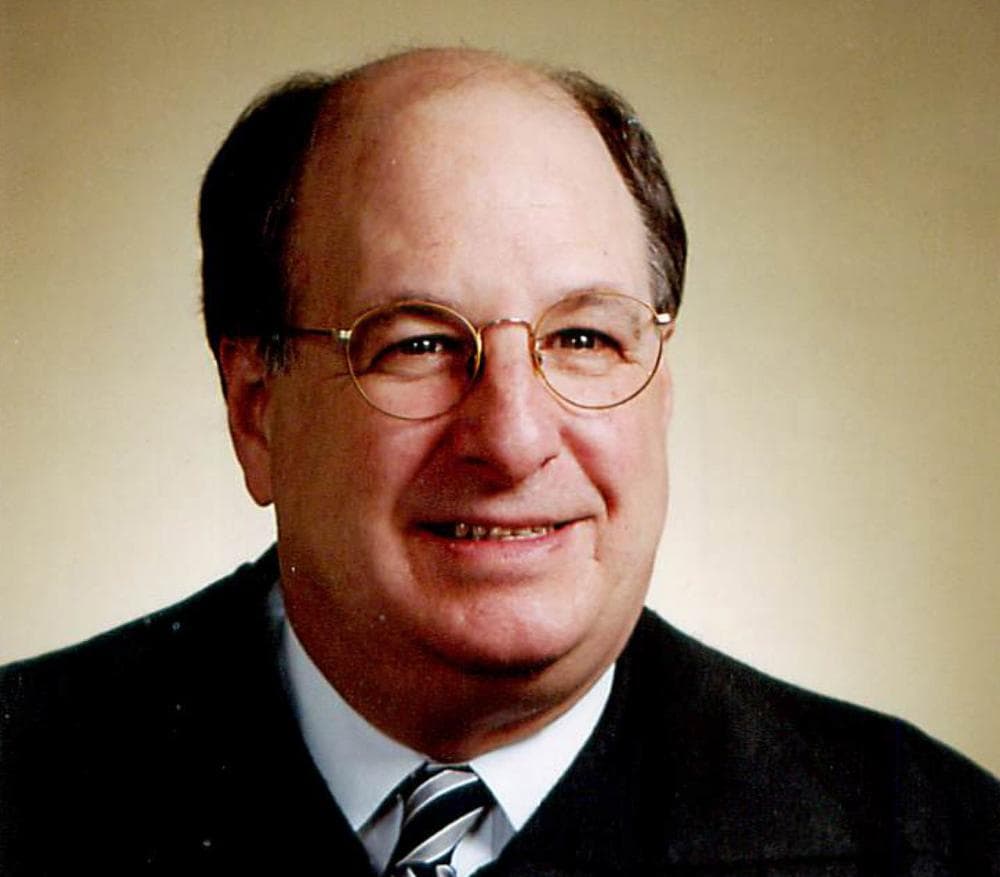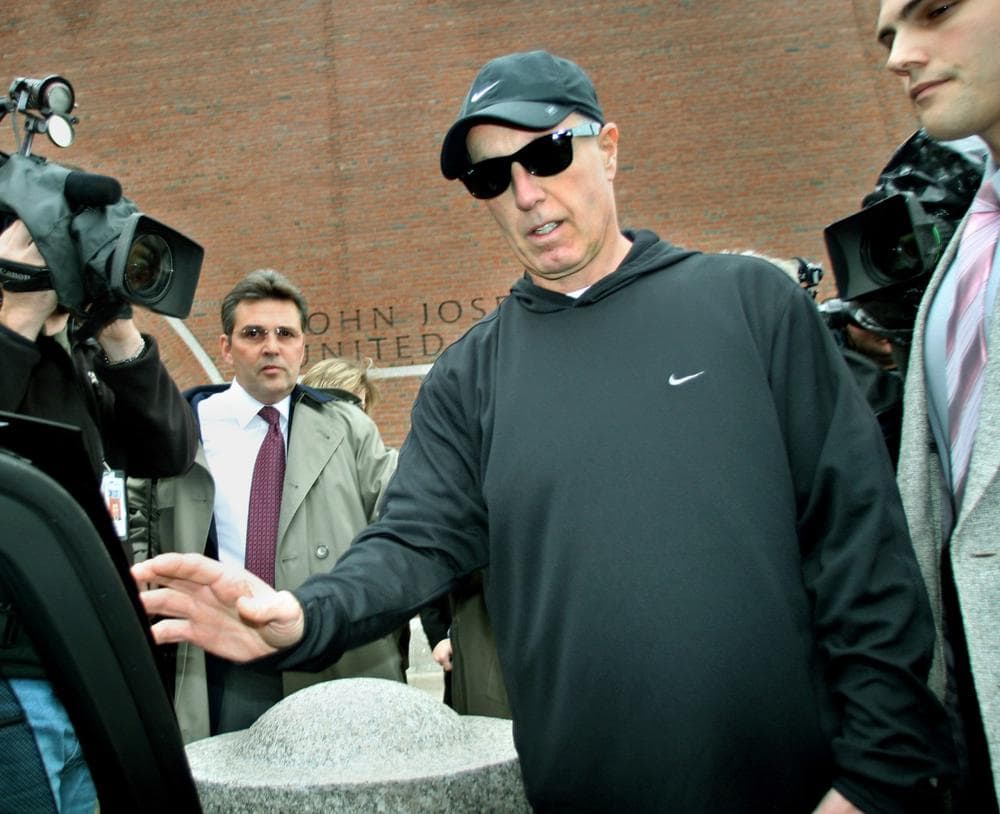Advertisement
Evidence Of Misconduct: The Judges’ Rebellion
Resume
When Assistant U.S. Attorney Jeffrey Auerhahn joined Boston’s war on organized crime, he turned his focus to an up-and-coming mobster named Vincent Ferrara. The operation was called “Tunnel Vision," which would prove a fitting description for Auerhahn's alleged rule breaking to bring down his target. Auerhahn thought he had a smoking gun in a witness who testified that Ferrara ordered a hit. Problem is, the witness lied. Worse, a judge ruled Auerhahn knew he lied — and covered it up.
The case raises troubling questions from critics who worry that withholding evidence has become a tactic of some federal prosecutors. Those critics question whether Justice can police itself. In this third report of a three-part series, we consider the Justice Department's handling of the case.
"A timid judge, like a biased judge, is intrinsically a lawless judge."
Supreme Court Justice Felix Frankfurter
Patsy Barone changed out of his prison jumpsuit and walked out of the federal courthouse on his way to a party in East Boston on Oct. 24, 2005, leaving then U.S. Attorney Michael Sullivan behind, and in front of reporters putting him on the defensive.
Federal Judge Mark Wolf had just released one man from prison as he would later release another who was a Mafia capo. With righteous indignation, the judge told the court and Sullivan's assistants that he had no choice but to release Barone because the extreme misconduct of federal prosecutor Jeffrey Auerhahn had deprived both Barone and Vincent Ferrara of their rights to a fair trial.
 Wolf even proclaimed that the government owed Barone an apology. In the courthouse lobby, Sullivan now snapped back to reporters that Barone owed an apology to the family of the man he had just admitted to murdering. As for what the judge had concluded about Auerhahn, Sullivan's assistant, Sullivan said: "These are very serious allegations. We've acknowledged that to the court and in fact we’ve asked for a complete investigation to get to the bottom of these allegations."
Wolf even proclaimed that the government owed Barone an apology. In the courthouse lobby, Sullivan now snapped back to reporters that Barone owed an apology to the family of the man he had just admitted to murdering. As for what the judge had concluded about Auerhahn, Sullivan's assistant, Sullivan said: "These are very serious allegations. We've acknowledged that to the court and in fact we’ve asked for a complete investigation to get to the bottom of these allegations."Wolf clearly wanted Auerhahn to be held accountable, but the U.S. attorney had asked the court not to impose any sanctions until the investigation was completed. So Sullivan referred the matter to the Justice Department's Office of Professional Responsibility. Better known as the OPR, it is supposed to investigate complaints and allegations like those raised against Auerhahn.
Can the Department of Justice investigate itself? "Well of course it can't," says local criminal defense attorney and civil liberties lawyer Harvey Silverglate. "It seems to me that’s obvious."
Silverglate says that what Auerhahn is accused of doing is far more routine than the few high-profile cases of misconduct suggest. How the government responds is equally routine, he says.
The Roach Motel
Consider the Office of Professional Responsibility. It has no subpoena powers, seldom comes up with new facts and works at snail’s pace. So dismal is the reputation of the OPR that its critics call it “The Roach Motel" — because, Silverglate explains, "cases go into the Roach Motel and never come out."
"I can’t say who may have dropped the ball. It might have been me who dropped the ball, but it certainly was not intentional."
U.S. Attorney Michael Sullivan
Some judges clearly don’t trust the OPR to do anything. Consider the recent case of ex-Alaska Sen. Ted Stevens. In 2008, Stevens was convicted of ethics violations — all felonies. Political observers say the conviction probably caused his loss in the election that soon followed. But a few months later, his conviction and indictment were thrown out.
Prosecutors had intentionally withheld evidence and even dismissed a witness who might have cleared Stevens. Upon discovering this, the trial judge, Emmet Sullivan, said he wasn’t going to waste any more time dealing with the Office of Professional Responsibility. So he appointed a special prosecutor to investigate all six federal prosecutors in the case for any criminal wrongdoing.
Silverglate calls the actions of Judges Sullivan and Wolf "a rebellion by a minority of members of the judiciary who have seen enough."
Former U.S. Attorney Sullivan says his office and the OPR acted responsibly and properly in the matter. He says there is no growing problem of prosecutors who withhold “exculpatory “evidence from defendants. "It’s statistically insignificant," he says. "The question becomes: Is it intentional or inadvertent? Obviously intentional discovery violations should be treated very harshly."
Judge Wolf Waits For Answers. And Waits
Told by Sullivan in 2003 that he would be informed of the outcome of the OPR investigation, Wolf waited. And he waited. Three years passed. By the end of 2006, he had heard nothing. He wrote to U.S. Attorney General Alberto Gonzales to find out what in the world was going on. In response, the judge got a letter saying that the OPR had actually taken action against Auerhahn — two years earlier.

The OPR had concluded that Auerhahn had “engaged in professional misconduct." But though the letter told Wolf that “disciplinary action was taken” against Auerhahn, it didn’t tell him what action was taken or include the report.
"I do know that OPR's findings and recommendations are considered confidential," Sullivan told me in a recent telephone call.
Even the judge had been kept out of the loop. "This is kind of like if a tree falls and nobody hears it. There is no sound," Silverglate says. "And it certainly is not going to lead to anything that's going to reform the legal system because there is no public record something really awful was done here."
Through hard experience, Wolf had become a foursquare defender of rigorous standards and rules. He had worked at the highest levels of the Justice Department to clean it up after Watergate and he had worked as a federal courtroom prosecutor here in Boston. He'd been appointed by Ronald Reagan and become chief judge in the federal Court of Massachusetts.
He was not going to be brushed back now by the Justice Department or Alberto Gonzalez.
Turning Over Rocks
Silverglate says Wolf feels a special obligation as the chief judge of the federal court "to actually turn over the rocks and see what's crawling underneath." Under one of those rocks was the OPR report the government still hadn’t provided.
“It doesn’t much matter if there’s a personal letter of reprimand in a prosecutor’s file, because no one knows about it.”
Attorney Harvey Silverglate
Wolf shot back at Gonzalez in a scathing letter of demand. He finally got the full report in May 2007, almost two-and-a-half years after the OPR had come to a conclusion and despite Sullivan's pledge back in 2003 “to provide the court with the results of its investigation."
In my telephone conversation with Sullivan, I noted that had Wolf "not dragged the information out of them, it doesn't sound like he would have gotten it."
To which Sullivan answered, "I can’t say who may have dropped the ball. It might have been me who dropped the ball, but it certainly was not intentional."
It's May 2007 when Wolf finally gets the envelope from the OPR. Almost four years have passed since he'd found that Auerhahn had engaged in extreme and intentional misconduct. Now he opens the envelope and finds that the punishment for Auerhahn was no more than a letter of reprimand from Sullivan — a secret letter of reprimand stored confidentially in his file.
To Silverglate, this is the OPR as the Roach Motel, where nothing comes out. "It doesn't much matter if there's a personal letter of reprimand in a prosecutor's file, because no one knows about it," he says.
And the OPR’s actual finding, when he read it, was unacceptable to Wolf. The OPR had concluded that Auerhahn had committed misconduct, but it found that the misconduct was merely “reckless” rather than “intentional” and "extreme," thereby putting what he had done in a more innocent light — a matter of “poor judgment."
The softer accusation also served to soften the range of penalties for Sullivan to choose from.
The Judges Break New Ground
Even as the OPR was sitting on its finding of misconduct and Wolf went uninformed, assistants in the office of the U.S. attorney had been in court trying to get Wolf's ruling overturned after he released Ferrara, the defendant in the case that sparked it all. Their argument? That Auerhahn had not committed misconduct because he had no obligation to turn over the crucial evidence to Ferrara.
These were the two faces of the government. Auerhahn was secretly reprimanded but publicly praised by Sullivan both before and after. Bernard Grossberg, who defended Patsy Barone at trial, concludes that: "In situations like this, you cannot leave it to the DOJ to police themselves."
And that was the conclusion of Wolf. Determined that Auerhahn be held accountable for misconduct and possible perjury, the judge filed a complaint with the Office of the Bar Counsel in Massachusetts in 2007. In asking for an investigation, the judge wrote that the evidence against Auerhahn was more than sufficient to consider whether the federal prosecutor should be suspended or disbarred.
Bar Counsel, which is an independent office that investigates complaints against local attorneys, including those in the federal district of Massachusetts, conducted an investigation. Last summer, Bar Counsel concluded that there was probable cause that Auerhahn engaged in misconduct. It petitioned the court to issue an order to Auerhahn to show cause why he should not be disciplined.
A federal judge agreed that the evidence met the standard of probable cause and sent the case to a three-judge panel to decide the matter. Auerhahn moved to dismiss the proceeding, the judges ruled against his motion, and here the matter rests. The judges are on new ground. Which is to say, the matter of judges disciplining federal prosecutors is as new as allegations of misconduct are old.
Revisit any story in this series and explore the interactive pages on our series page.
This program aired on February 19, 2010.
